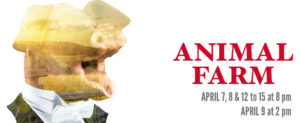Literary classic Animal Farm comes to the stage
March 27, 2017, by Matthew Krajniak
 The University of Houston’s School of Theatre and Dance brings a literary favorite to life this April with its production of George Orwell’s 1945 classic, Animal Farm. That’s right, the gang is back with Napoleon, Snowball, Old Major, and all the others as they oink, neigh, hee-haw, and talk in a thinly-veiled way about the events that led up to the Russian Revolution of 1917. The book is read in classrooms around the United States and is included in Modern Library’s 100 Best Novels of the 20th century.
The University of Houston’s School of Theatre and Dance brings a literary favorite to life this April with its production of George Orwell’s 1945 classic, Animal Farm. That’s right, the gang is back with Napoleon, Snowball, Old Major, and all the others as they oink, neigh, hee-haw, and talk in a thinly-veiled way about the events that led up to the Russian Revolution of 1917. The book is read in classrooms around the United States and is included in Modern Library’s 100 Best Novels of the 20th century.
Already a thought provoking story, what’s more is that this play has a unique production in that it’s being performed not only with hand-crafted masks to help create the animals, but also as a musical. I was able to do a quick Q&A with Bill Brown, the play’s director, and Robert Shimko, the Director of the School of Theatre and Dance, about the project and the process of bringing the story to the stage. Here’s what they had to say.
MATTHEW KRAJNIAK: Rob, you have several guest artists working on this project. Who are they?
ROBERT SHIMKO: Well, Bill Brown is a professional director from Chicago with a long and impressive resume. We were able to bring him down to Houston thanks to a generous Innovation Grant for the Cynthia Woods Mitchell Center for the Arts. That grant is also paying for two other guest artists: music director Jack Beetle and mask maker Phil Nichols Jr.
MK: How did UH’s School of Theatre and Dance come to choose Animal Farm as a production?
RS: I got the idea for adding Animal Farm to our season about two years ago. Dr. David Rainbow of the UH Honors College approached me to discuss a project he had in mind called “Revolutionary Dreams,” a cross-disciplinary set of loosely interconnected arts and humanities events that reflected on the hundred-year anniversary of the Russian Revolution. Around that same time, I happened to read Sir Peter Hall’s adaptation of Animal Farm because it related to one of my Master’s students’ thesis project. Hall actually taught for a few years in the UH School of Theatre & Dance, and his picture hangs alongside folks like Edward Albee on our faculty wall of fame. In addition, Hall also created this musical version of Animal Farm in the 1980s with some collaborators. So given the timeliness of the centenary of the Revolution, the chance to pay tribute to Peter Hall, and the fact that our program has not put on a musical for a few years, it seemed like the right project at the right time.
MK: And, Bill, what attracted you to this project?
BILL BROWN: Well, I make my living as a professional director, but every year or so a university contacts me regarding a project that wouldn’t have come my way in the professional theatre—such as when Rob Shimko contacted me about Animal Farm. And at first, I wasn’t sure if this was really for me, but every time I say that, I always take the job because I know it will be just the kind of challenge I need and that I’ll always end up enjoying the hell out of it. That’s exactly what happened here.
MK: What challenges did/does this production present to you?
BB: Challenges? Oh, dear! You begin by deciding how much “animal” you want to invest in. The first design meetings last fall coincided with the callbacks, and we explored down-on-all-fours imitations of animals and also a hybrid. We went with the hybrid, since the animals in the story are, after all, allegorical. In terms of design, we had the same challenge: How much animal? We knew the project could easily slip into the musical Cats. Not to mention other challenges like how the play has multiple settings that should happen seamlessly, and how to light the damn thing, and did I mention that it’s a musical? That’s a boatload of challenges. Well as it turns out, there is both a ton of musical talent and well-trained young actors here at this school, and under the able guidance of Jack Beetle, we’re doing just dandy. I’m quite proud of everyone.
MK: Can you briefly talk about the masks Phil Nichols Jr. created?
BB: Phil is terrific and provided invaluable help from the beginning. We are not doing full masks. We can’t lose that much “human.” There are snouts, and beaks and manes and horns.
MK: Finally, were there any surprises during the development of this project you care to share?
BB: The most wonderful surprise is just how human these animals really are. The story is, of course, timeless. There will always be revolutions, fueled by oppression and idealism. And just as likely, those revolutions will be corrupted. But the play is more than a political allegory. These animals know pain, fear, joy, confusion, friendship, mistrust. They work heroically to become a community. It is their hope, their continual optimism in the face of failure that is the real secret of the play.
Animal Farm
From the novel by George Orwell. Adapted by Sir Peter Hall. Lyrics by Adrian Mitchell.
Music by Richard Peaslee
Directed by William Brown
Wortham Theatre, UH main campus
April 7th, 8th, 12th, 13th, 14th, 15th at 8pm and 9th at 2pm
For more information click here

